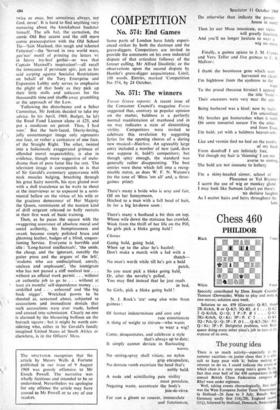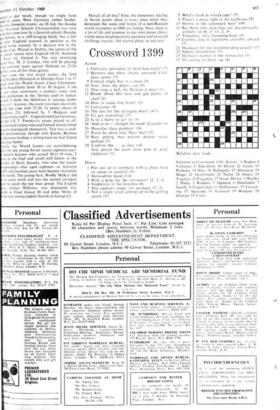Chess 460
PHILIDOR
Specially contributed by Dom Joseph Coombe
-
Tennant (Downside). White to play and mate two moves; solution next week.
Solution to no. 459 (Grevatt): Q-R5, threat 2R-Kt4c.h, B or Q-K5; 3Q-B3. A 1 . Q-K2; 2 Q-Kt5ch, Qx Q; 3 P x P. B I . . . Q-K3; 2Kt-Kt6ch, Q x Kt; 3P x P. C 1 . . . Q-K4; 2Q x Pcb, Q x Q; 3P x P. D1 Q-K5; 2Kt Qx Kt; 3Px P. Delightful problem, with Black queen doing every other piece's job in turn at the expense of its own.
The young idea
There is so much activity—especially in the summer vacation—in junior chess that it is diffi- cult to keep pace with it; before making an attempt to do so, I could indicate the extent to which chess is a very young man's game by the fact that over half of the 450 competitors in t annual British Chess Federation congress Rhyl were under eighteen. Well, taking events chronologically, first there was the West European Junior Team Tournament in Holland-26 June to 3 July. Result: West Germany easily first (144/20), England second (114), followed by Holland, Denmark, Switzerland, ostrin—a par result, though we might have pped to press West Germany rather harder. ben two domestic events: on 26 July the Sunday Fos National Schools Championship was won fate first time ever by a Scottish school, Dundee
School, in a cliff-hanging finish, but a few
later England restored its position as the ;ding home country by a decisive win in the iorney Cup. Played in Dublin, the scores of the junior teams were England 14/18, Scotland Wales 61, Ireland 6. The very promising oglish boy, M. J. Corden, who will be playing the national team against Holland on 25-26 nober, won all his three games. Then came the two major events, the 16th rorld Student Olympiad at Dresden from 1 to 17 gust and the World Junior Chess Champion- in in Stockholm from 10 to 30 August. 1 am sure what constitutes a student; some very duly gentlemen in the 'thirties used to appear now I think the definition is 'anyone under enty-six'. Anyway, the event was most decisively 7n by the USSR with 27/36, 54 points ahead of goslavia 214 followed by 3—Bulgaria and tSt Germany and 5—England and East Germany, h the US 7. Twenty-six teams played in all, h Scotland twenty-one and Ireland twenty-three ing to distinguish themselves. This was a cred- kle performance, though with Keene, Basman
Hartston leading a strong team we had hoped do even better.
Finally the World Junior—an overwhelming or for the young Soviet master eighteen-year- Nnatoli Karpov who scored 10/11 (9 wins, 2 in the final and could well follow in the teps of Boris Spassky who won the junior Tipionship—also aged eighteen—at Antwerp 1955 and fourteen years later became champion be world. The young Scot, Roddy McKay did to come tenth and was the second youngest ■ ,er to reach the top final group. The English ■ er, Arthur Williams, was nineteenth (i.e. enth in Final Group 13) and John Moles of Lind was twenty-eighth (fourth in Group C). Morals of all this? First, the temporary decline in Soviet junior chess is over; once more they dominate the scene and hopes of a non-Russian world champion in 1980 are fading. Next, there is a lot of life and promise in our own junior chess; a little more toughness and experience and wecould challenge anyone—for second place, at any rate.











































 Previous page
Previous page